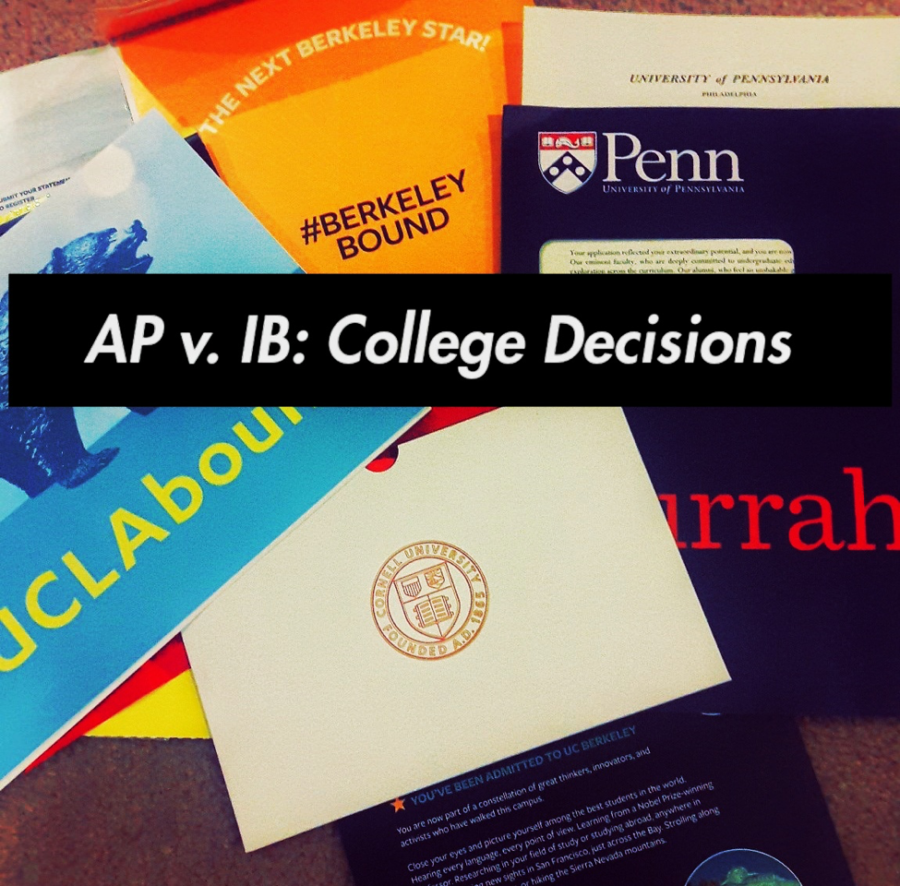AP v. IB: University Decisions
April 28, 2018
The last couple of months have been very stressful for many high school seniors. The first semester was filled with college applications, teacher recommendations, and hardcore SAT/ACT cramming. Now, the second semester is filled with the anxiety and stress of college acceptances and rejections. This can be a depressing time in a student’s high school career. However, there are also many triumphs and rewards that result from the college application process. For example, a student can get accepted into their dream school or receive a full-ride scholarship to a prestigious university. The victories are endless.
In the college application process, a competitive applicant is seen as one that pushes their academic abilities by taking a rigorous curriculum and participates in many extracurricular activities. Thus, a major question for many high-achieving QHHS students is, “AP or IB?” Which program is more beneficial in the college application process? Which one will help me get into top universities and receive full-ride scholarships? These are the questions that many freshmen and sophomores face as they head toward junior and senior year.
International Baccalaureate (IB) is a program that focuses on the student as an individual that is part of a bigger, international picture. This focus is most indicative of its recognition worldwide and the international emphasis that is incorporated into every class. On the other hand, Advanced Placement (AP) is much more focused in the United States.
IB is also stricter than AP. Students taking IB must take certain classes and complete a set amount of hours of community, action, and service projects. They must also write an Extended Essay and do multiple internal assessments that are scored as part of their IB exams in May. On the other hand, AP allows the students to have more choice in their academic endeavors. They are allowed to choose their own classes and schedule their days accordingly. AP also does not require the students to complete any volunteer and/or extracurricular hours. Despite these differences, students are able to receive a rigorous curriculum in both programs.
The senior IB class experienced many triumphs when it came to college decisions. Many were admitted to the popular UC and Cal State schools like UC Los Angeles, Berkeley, San Diego, and Long Beach. There were also students that received full-ride scholarships to schools like USC, Stanford, and the University of Arizona, and others were admitted to the Ivy League schools of Princeton, Cornell, and the University of Pennsylvania. The senior IB class also had some students that were waitlisted at many prestigious universities like Columbia, Harvard, UC Los Angeles, UC Berkeley, Johns Hopkins, and the University of Chicago.
A prime example of the benefits of IB can be seen through Michael Wood, an IB Senior that received a full-ride scholarship to Stanford and was accepted into Princeton. When considering if he believed that he would have still gotten into Stanford and Princeton if he were an AP student, he replied with a concise “no.” According to Wood’s reasoning, “AP is inferior to IB in every single way.” However, this statement can be disproved by the achievements of many AP students.
Similar to the IB class, the senior AP class impressed during the college application process. Again, many were accepted into popular UC and Cal State schools like Cal Poly Pomona/SLO, UC Berkeley, UC San Diego, and CSU Long Beach. There were also many students that were accepted to good out-of-state schools like Georgia Tech, George Washington University, Pepperdine, and Northeastern University. The AP class also had some students that were waitlisted at many top-tier universities like UC Los Angeles and UC Berkeley.
Shivani Kangkar, a high-achieving AP student, stated her opinion on whether one program is better when it comes to college applications: “Honestly I don’t think either program is better than the other… college acceptances depend on your GPA, SAT score, extracurriculars, and the major you’re applying for.”
On the other hand, IB Biology and Anatomy teacher, Mrs. Nichter believes that IB does have its advantages in the college application process. To her, “IB makes you a complete package whereas [in] AP, you don’t have to do the extracurriculars that IB makes you do.”
As one can see, there are many conflicting opinions when it comes to the benefits of IB and AP in the college application process. However, based on the evidence, any student that works hard and takes a rigorous curriculum is bound to get accepted into a great university. Whether it be Harvard or UCLA, an AP or IB student will do well wherever they go and make the best out of their college experience.



